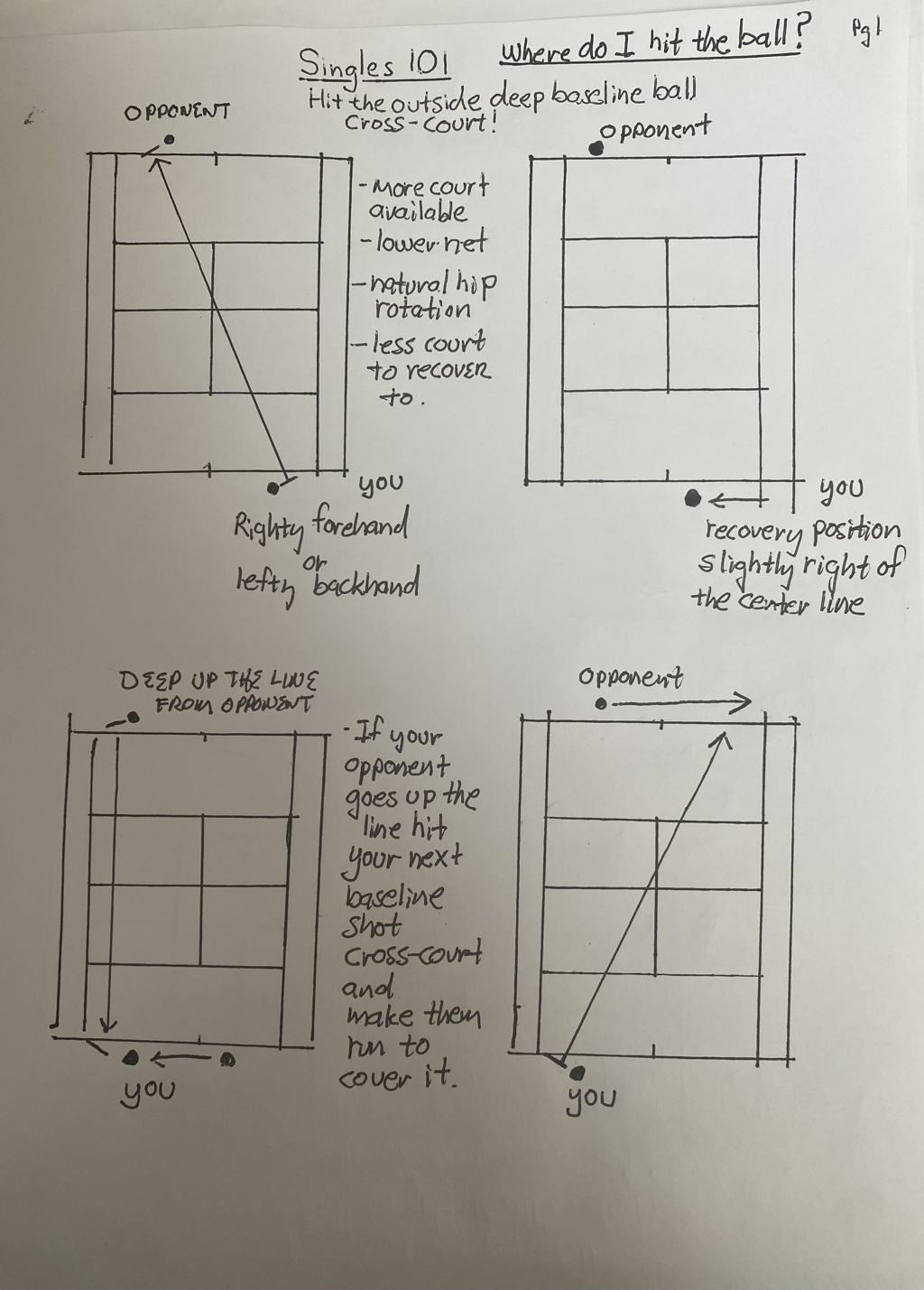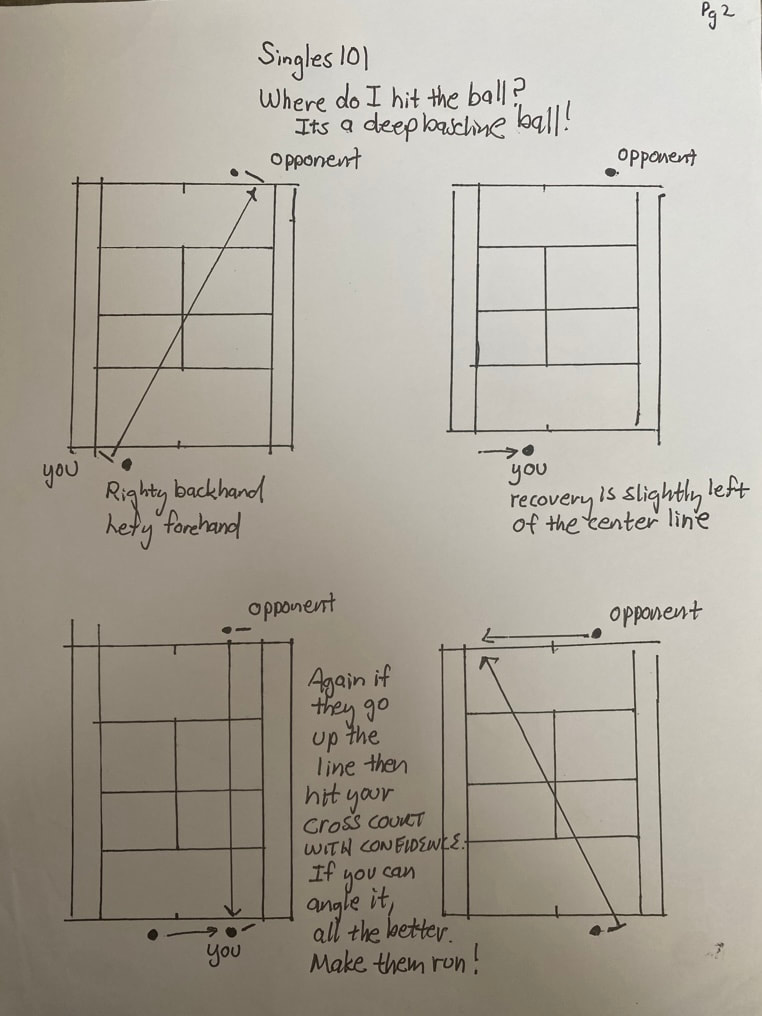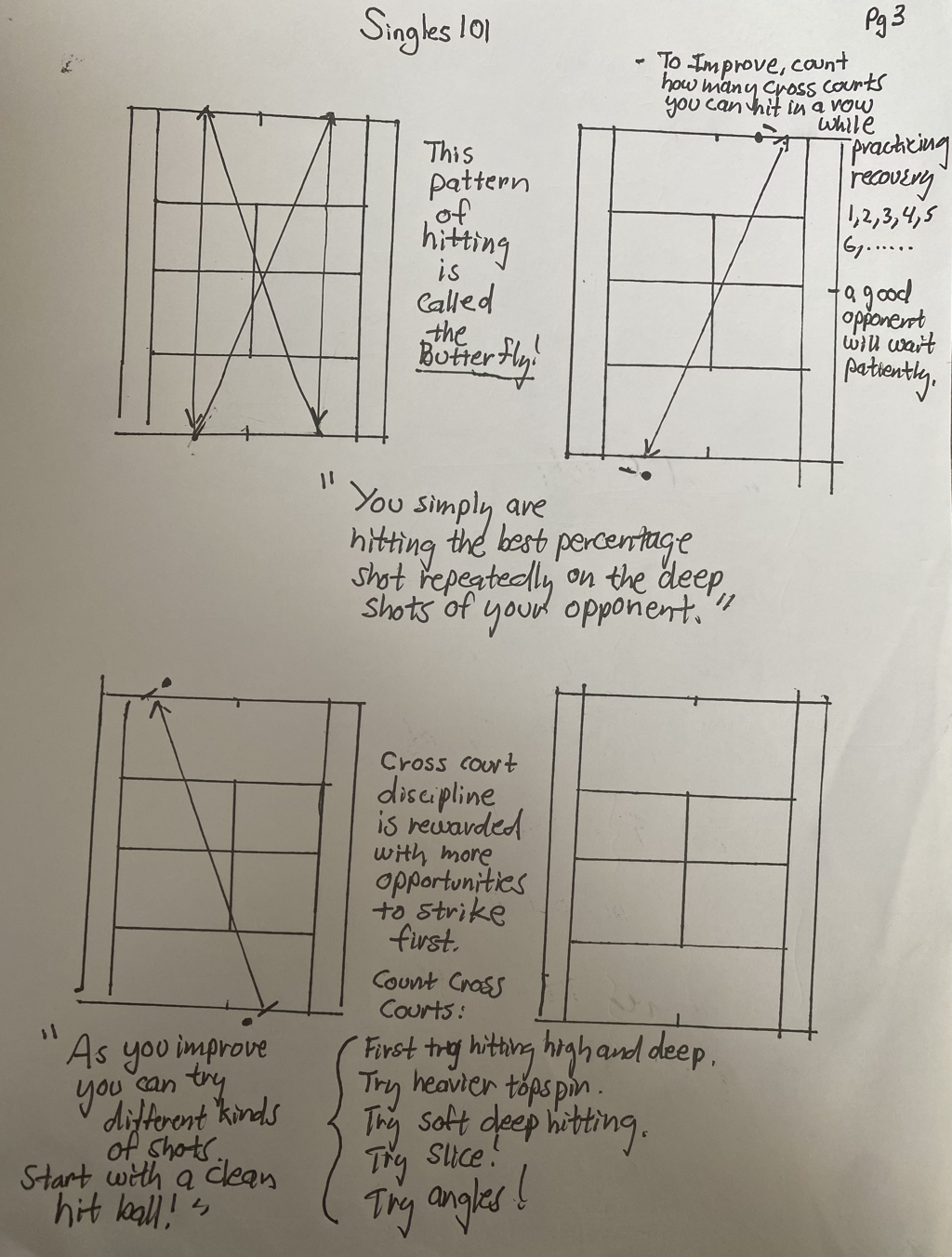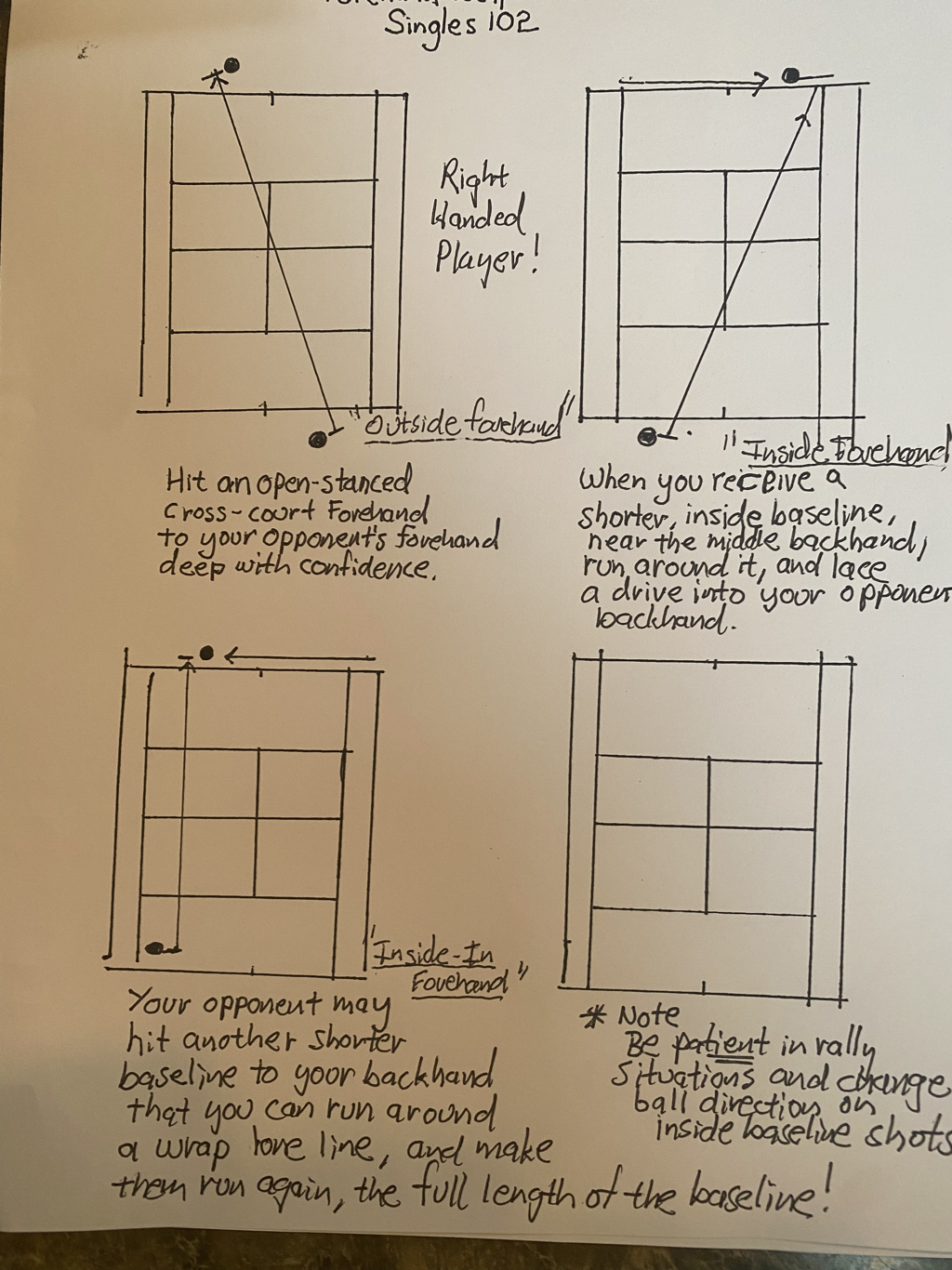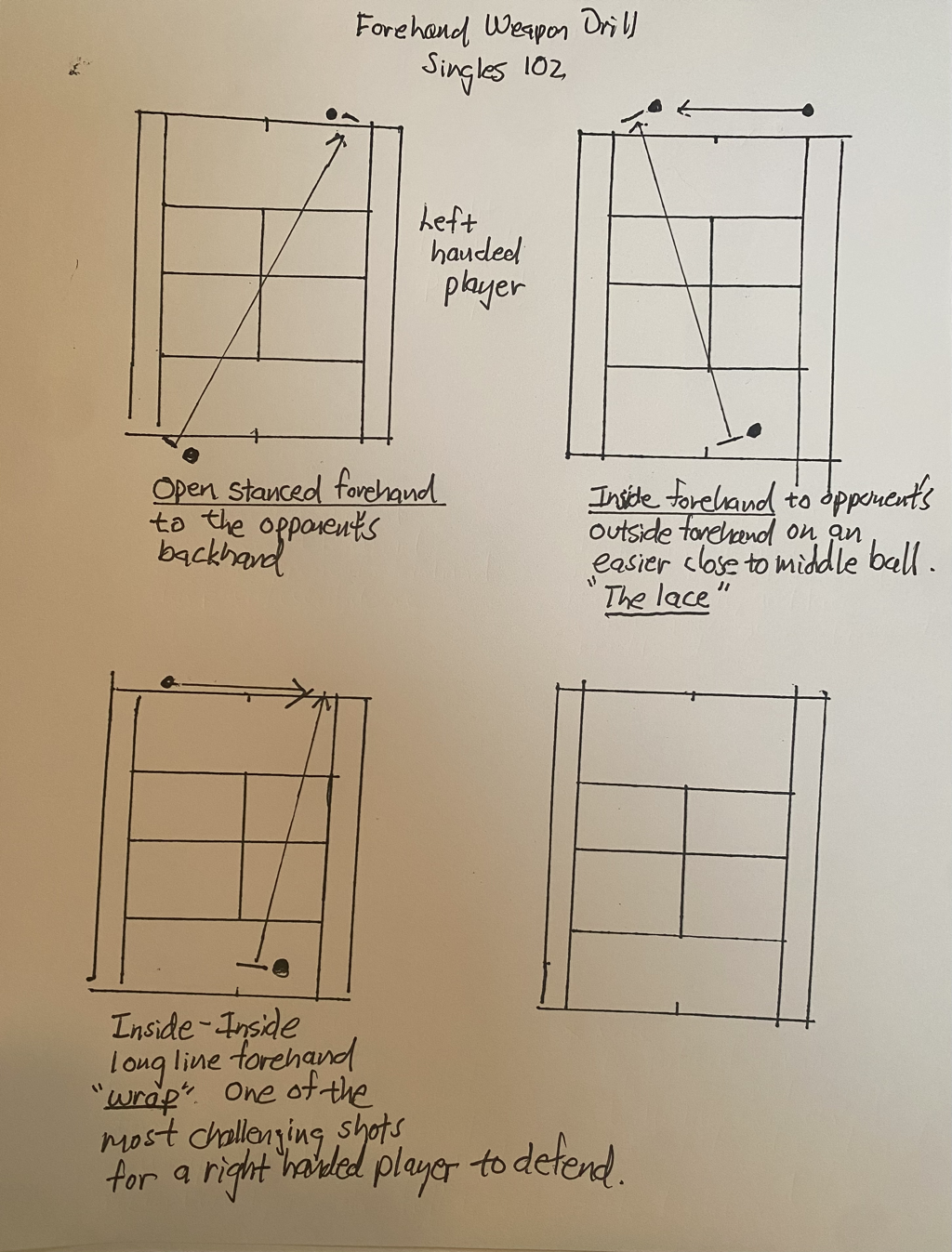|
John McEnroe won 155 career ATP titles including 7 major singles! I saw him play Davis Cup at Newport on grass. John could take the net like no one I’ve ever seen. His simple swing take backs, counter punch attack style is amazing. As a lefty he stands about 8 feet to the right of center when serving to the deuce box in singles. He lines his serve up sideways, back to the fence, then hits out wide or down the T and then rushes in to hit an approach volley, if his serve is returned! His forehand volley he could take early in the air behind the receiver or volley cross court. If a rally ensues, he finishes with a drop volley, power volley, or overhead. He protected the net in singles like a hockey goalie. On his return of serve, he takes the ball early off the hop, similar to the saber of Federer. Then he’s at the net! His return placements were low and away from opponents making passing shots challenging. He and his doubles partner, Peter Fleming are one of the greatest doubles teams of all time. Check out this collaborative tennis video from two of the best online tennis coaches—Ian and Jeff. youtu.be/jVkMyQWBh9Y?si=TUKmlK_BcqnmOTE1 We will be using these warm-up and training styles over the next few weeks to add foot speed and quickness to your game!
0 Comments
Tennis Training
Training for tennis is an art form. This program gives you a complete off court training program that will make you extremely fit for tennis. It includes full body strengthening, yoga stretching, and speed work. Also a nutritional guideline is mentioned. Monday Wednesday Friday are your StrengthTraining Days Your total body gets a workout! Its three days per week, quick and efficient. Mondays Full Body Strength by Heather Robinson, 30 minutes Dumbells needed. youtu.be/pbkrx340TBM?si=tOJ5eT_e0Cx3o-q5 10 minute full body stretch after. Tuesdays Flexibility & Recovery Day Yoga from MadFit https://youtu.be/sTANio_2E0Q?si=dEFJFx-RSr-QWf6Z Wednesdays Full Body HIIT (High Intensity Interval strength training) with no weights Caroline Girvan youtu.be/z3h_3UOBAVU?si=aWPJPIhH28OuE8rh 10 minute full body stretch after. Thursdays Flexibility 22 minute Yoga by Breathe and Flow youtu.be/B4kNiCWTl7M?si=KqZW8dbJ6bDrKSjA Foot Speed & Conditioning 20-30 minute session Train for 12 seconds as hard as you can go take 12 to 16 seconds break repeat This simulates the breathing required for tennis point play. Remember if you ran a play clock on a match it’s much shorter than the actual match duration. Change the drills you are doing. You can also shorten the exercise time to even 8 seconds if you are getting tired. Every 3 minutes take a 30 second break. You have to push very hard on these sessions. And they are the most grueling. Side to side hop jumps Rope skipping High Intensity Footwork and Shadow Swings with your racquet Include recovery footwork not just swinging- split hop, hit, recover, repeat Short Sprints Full Body Stretch after 10 minutes Fridays Full Body HIIT 30 minute workout using dumbbells with Caroline Girvan youtu.be/aAt8o5kYnCE?si= 10 minute full body stretch after. Saturdays Foot speed and conditioning 20-30 minute session Train for 12 seconds as hard as you can go take 12 to 16 seconds break repeat This simulates the breathing required for tennis point play. Remember if you ran a play clock on a match it’s much shorter than the actual match duration. Change the drills you are doing Side to side hop jumps Rope skipping High Intensity Footwork and Shadow Swings with your racquet Include recovery footwork not just swinging- split hop, hit, recover, repeat Short Sprints You can also shorten the exercise time to even 8 seconds if you are getting tired. You have to push very hard on these sessions. And they are the most grueling. Full Body Stretch after 10 minutes Big Gym Day’s Read this! You could substitute a one or two full body strengthening days HIIT day gym workouts with Big Gym Day(s) using barbells and dumbbells or do Two Monday workouts listed above, One Monday and the other on Friday. Big Gym Days Only do two days per week maximum with big gym days. A Monday and Friday split is my recommendation to let your body recover! Do three sets of each exercise with proper form of 10 to 15 reps for three sets. You should be do 60 percent of your maximum to push yourself and add more repetitions, intensity, or weight for the next time you exercise so that you are always progressing. Avoid lifting more weight than you can execute only 10 times for three sets. Once you get to three sets of 12–15 then add more weight. You don’t want to injure yourself or be too tight from lifting and limit range of motion due to soreness. Some soreness is good because you’re building muscle. Pain isn’t good. My recommendations If you don’t know these exercises it is best to have a trainer show you or watch a video on You Tube beforehand. These are the main exercises you’ll need for increasing strength. Start with lower weights and then add as you improve. Don’t rush to add lots of extra weight. Tennis players need to have flexibility too. You need strength, flexibility and stamina. Many of these exercises can be done on exercise machines which involves adjusting the machine to fit your height and pounds to lift. This makes training very easy to navigate and very safe. Bench press bicep curls tricep extensions rows Squats Lunges Shoulder Press Skull Crushers Romanian Deadlifts Dead Lifts Rotator Cuff Exercises use a stretch band Ab Workout Nutrition for an Athlete! Lean Protein Veggies Fruit Seeds Nuts Grains Water Tea Supplement with Whey Protein Powder and Creatine in smoothies after strengthening workouts Avoid Cheese only as a treat on pizza Dairy limit Wheat / Gluten in large amounts Processed Foods Junk Foods Sugar Jannik Sinner won the Australian Open with a great win after being down two sets to love to Daniele Medvedev. Take a look at the fundamental forehand and backhand groundstrokes. His forehand appears to be a strong semi western grip with an hearty wrist lag. His palm points to the back fence. His backhand is a right hand continental (serve grip) and left hand a “south” eastern. His stroke is very similar to Novak Djokovic’s backhand on that wing. Review this short video to see how the fundamentals are executed. youtube.com/shorts/DqwJK6XzGvI?si=nAtNCMD4bguDDAQb Aryna Sabalenka was the women’s champion at the Australian with a win over Zheng Qinwen . Watch how to pounce on a shorter ball. youtube.com/shorts/84OQGxo97Hc?si=wGTjhfX1FcSY8rGM Also here are her groundstrokes.youtube.com/shorts/oFVJYwuY7_4?si=Lp0Y79eHDsKGFayB For a contrast check out Pegula’s no nonsense forehand. This style is easier for most players to reproduce and is more in line with how we expose players to forehand ball striking. youtube.com/shorts/vxsf-qStVN0?si=toP8Hogizm-vPe5rhttps://youtube.com/shorts/vxsf-qStVN0?si=c6lkHmFtsefKgyVh Here Jessica talks about the drop shot which is a great shot to own. Here you can see Jessica’s amazing open stance backhand.youtube.com/shorts/ozRGCLnSfvk?si=yWLNx42ROd-rHRNw This is Emma Raducanu’s serve. Watch the lag of the hitting arm and the high tossing arm extension. youtube.com/shorts/xTsVF1nQcnQ?si=vtVLY6Blpjqb7sCR
Simon from top tennis training does a great job explaining the roll of the wrist in your forehand. The followthrough for spin or more pace is clearly described. A great way to train is to practice your swings combined with footwork. Replay the video, pause it and copy the segments of the swing. Over the next session our groups will be working on this weapon system. youtu.be/lVSN-JEXPwM?si=2ei-45UT9flQ_Ck8 Milan from Serbia produces great instructional content on YouTube. He shows the forehand in a five step process. A great way to practice your forehand is to drop feed yourself and practice hitting the ball with footwork too. Milan whose channel is Tenfitmen produces excellent short clip videos as well. This guy will train anywhere in cold or hot weather. youtu.be/gdOYVCsE41k?si=vl-3_KA7B25redbj I endorse you to watch the videos many times with your tennis racquet in hand and work on improving these fundamentals every single day. You don’t need a tennis court to get better. Sure it helps. But when you get on the court you’ll have laser focus. Enjoy getting better every day!
ATP training coach Brian Dabul has produced this easy to follow footwork for the forehand. This player is basically covering the baseline with two steps. He’s being coached a 1-2 timing which is a great way to cover lots of court with the least amount of steps. If you are a smaller player you will need to take more. A wide athletic base with your knees bent and feet beyond your shoulders is required. This is a counter attack forehand. youtube.com/shorts/u0YvuPbd8J4?si=Rz-G1WOEgdM5NvUh In this next video Coach Patrick Mouratoglu breaks down Victoria Azarenka’s Two Handed Backhand. Azarenka has a great semi-open two handed backhand that also gives her great power on balls hit inside the baseline and those taken on higher deep shots outside the baseline. youtu.be/2luiv1xAzY8?si=dfjAZSLMs6SjPfQx This is a neutral stance video of Novak D’Jokovic hitting a forehand. This is using more forward movement into the court with the left foot. youtube.com/shorts/G7ZJNaszMrc?si=b48xhgq4lfmAdBH2
There's a ton of content out there on the proper way to hit the volley. In this brief post I'll go over the main points of how to hit a solid volley. There are two main kinds of volley: the mid court and the "at net". To play the net well you need both.
Here's some main points: keep your hands down and elbows bent slightly away from the body, in an athletic stance, with hands below the racquet, and hop up at contact of the player hitting the ball. The grip is continental for most players, but some players may not be able to hold a solid grip and require more grip changing to secure the racquet. The racquet head preparation is loaded at the height of the ball, keeping technique simple. Keep your elbows out a little. Set the racquet where the ball is going to arrive! This produces flat volleys! Keep your strings facing the target. I found this tip by from Ryan (Two Minute Tennis). I think it's really good. I do however coach more backspin than he does (on the backhand volley) video.youtu.be/rpacFeUeioc?si=XCIzcIJm3MaiAjEe. If you look at Stefan Edberg one of the best volleyers of all time (be patient, you'll have to see a few backhand volleys before getting to the forehand volley) you can see more slices being used on the bakchand wing. youtu.be/H89CnrqAruQ?si=0ivA7uOLxtaeHLBK Take a look at Bob Bryan hitting some volleys. This was back in 2013 with his brother, Mike. Notice that there is little if any slice on the forehand volley. His elbows are not as bent as Ryan's two-minute video, but they are bent. He uses a bit of slice on the backhand volley but not a ton. youtu.be/kWLI14pN_QI?si=FSn8Cf75DVdYHXaV. Also, I like the way Bob is taking volley practice near the center of the court. This is great volley practice for doubles where most of the action is. And finally, this is Leander Paes, the most amazing hands I've ever seen in doubles. His form is similar to Bob Bryan and Mike Bryan. youtu.be/o6qTdftF5LA?si=1Rt8fSzrChNt33SI What about two-handed backhand shots? There's no better in the business than Chris Evert! youtu.be/gfF9noOf1W0?si=2kDh6Sa_YDIgwpMF Emma Raducanu won the US Open in 2021. She’s a British Citizen who was born in Canada. She’s 5’9 and plays a two handed backhand. Her technique and timing is effortless. Note that she has relatively compact swings that allow for efficient power. Her backhand is her best shot and she’s now working on getting her weight transferred better off her forehand wing.
In the video you’ll see her hit open and neutral stance forehands. “Her racquet behind the shoulder preparation is completed before the ball has bounced.” This is critical for launching her weight into the ball. Notice how her load leg releases forward next to or in front of her body after the shot. The way she keeps her racquet moving steady from preparation till finish shows great timing of the ball which is a talent in itself. Try reviewing these shots and pausing to notice the phases of the swing. 1. Active feet 2. Hop up before the opponents contact 3. Touch Feet and turn, moving to the ball with early shoulder preparation 4. Balanced stance through contact with hip rotation 5. Followthrough with load leg release 6. recover position and repeat sequence again. youtu.be/ZSKOj6YsWzE?si=-wBl6anU0KF1GqtL What is a serve plus 1? youtube.com/shorts/Cj0bhW3L-M4?si=7Uri6z0LSTL0KEpv
In this video by Tenfitmen you’ll see Dimitrov pound a first serve and then quickly get ready to attack the return of the receiver with aggressive court position and pound the ball for a winning shot. The sequence begins with Dimitrov going through is serving ritual with a routine of leaning forward and pulling is right arm back. This rocking motion provides fluidity for his timing. From there, he rocks back, and then for forward, using a knee bend from a fixed platform stance, with a great left arm toss extension, a lagged racquet arm, finishing up high to the ball launch at 1 o’clock, landing into the court. Upon landing into the court he quickly resets his feet behind the baseline, now ready for anything high or low fast or slow. His first serve forced a high ball inside the baseline, where he then move forward with quick adjustments of the feet to hit off the right leg! This type of footwork allows for easier management of higher balls! From that load position he body slaps the ball for his plus 1. This type of play is a Serve plus 1–big serve, big forehand! To execute this play you have to force the up ball with a well located and or powerful serve, and have to develop your stance on the forehand to access higher ball contact points. These skills are fundamentals to high performance players. To be able to cover a tennis singles tennis court by ground and air is a physical challenge. The basic strategy comes from the geometry of the tennis court.
The geometry of the court is a rectangle. Four points to remember when hitting a cross court shot: 1.) When you hit a ball over the center of the net it has less height to attain clearance. 2.) There is more court available for landing the ball in play. 3.) The natural rotation of a balanced body is toward the cross court. 4.) You have less court to recover your position for a cross court than the down the line shot. These four factors make a “Cross Court Shot” the percentage shot! If you are running fast and arrive late to the ball a lob cross court high and deep may be needed to get back into the point. By hitting your outside cross court and deep to your opponent with any type of spin or flat you have neutralized your opponent. If you hit your cross court short you give your opponent opportunities to attack in various ways. Having the ability to hold a deep cross court rally patiently without changing the line of the ball whimsically is a “bread and butter” play that you should practice in your drill sessions. Whenever your opponent goes up the line on your deep cross court shot you can now make a “butterfly wing”. If you stay in deep cross court rally’s, the butterfly will come to you. Be patient and the butterfly will come. Take a look at the diagrams of the butterfly patterns for both righty and lefty players. Be sure to include steady deep cross court training in your practices and match play tool box. I realize my diagrams are a bit crude. In the future I hope to provide a more artful illustration. How to use your forehand in singles as a weapon is an art form. After you learn to hit steady Butterfly Patterns you can learn how to make your inside forehand open up the court by making your opponent hit outside shots on the run! This will create “opportunity balls” that will lead to rally finishing opportunities. Know that these plays take time to master, require quick ball recognition, with solid footwork and aggressiveness. Both left and right handed players will benefit from these shot selection patterns. These Fortissimo Forehands do not cancel the Butterfly Patterns, they add to them. When blended correctly together a fine game of moving chess is played on a large rectangle where cunning, quickness, anticipation, court awareness, technique, strengths and weaknesses, confidence, consistency, power, spin, and style all come into play.
|

